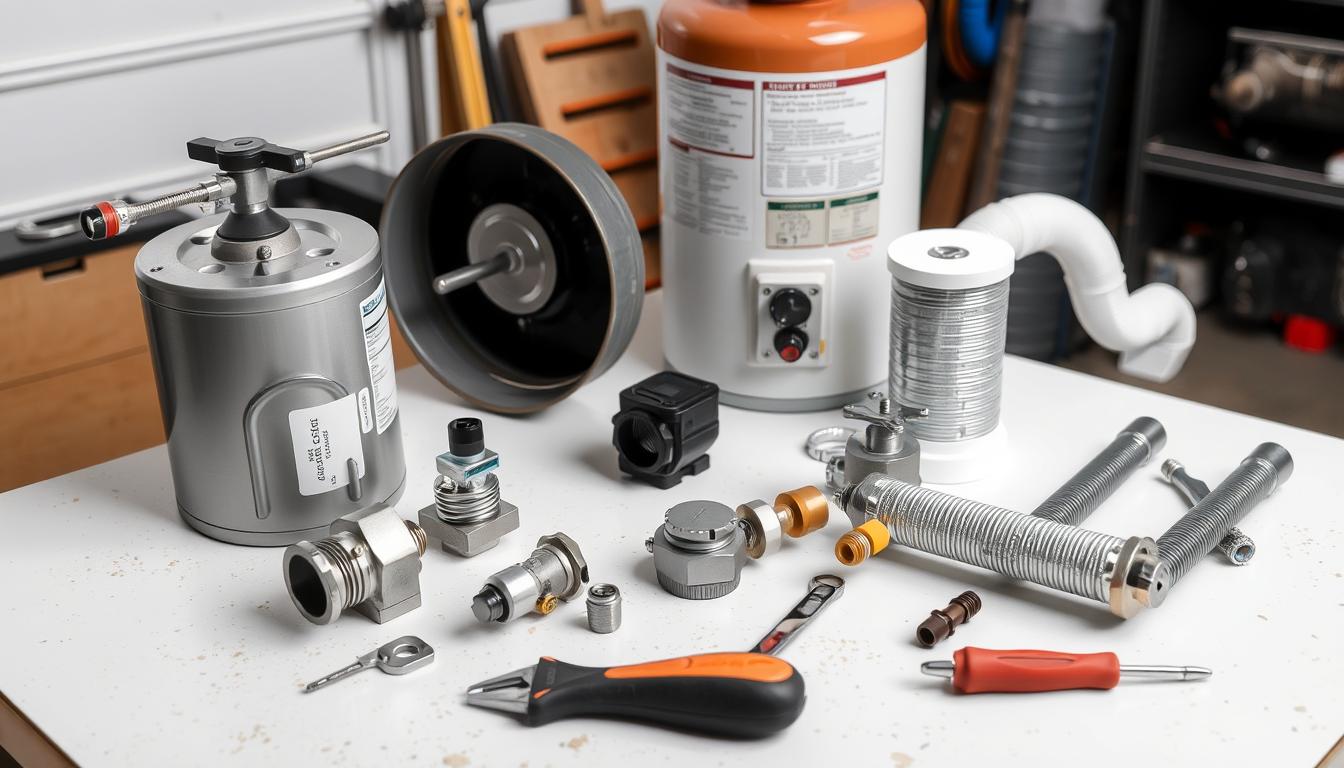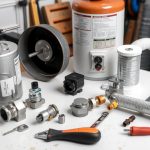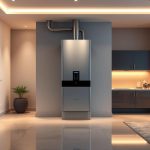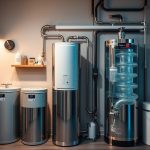I will never forget one wintry morning, when our home’s water heater went out. We were freezing and angry. This showed me how vital it is to learn about gas water heater parts and upkeep. Understanding how your water heater works can help you take steps to prevent cold showers and costly service calls. Gas water heaters in particular are intricate and require special care. The right information can help you resolve problems fast and save you costly replacement fees. In this post, we’re going to go in-depth into replacement parts for gas water heaters. You will be able to recognize key parts and get to troubleshoot typical issues. This will help you in maintaining your hot water system to run smoothly.
Key Takeaways
- Knowing gas water heater parts is crucial for gas water heater maintenance.
- Enables early detection to avoid costly repairs
- Do some things yourself, leave the rest to the pros
- Knowing when to do what can make your water heater last longer
- Choose the right tank type
- Choose the right tank size
- Decide which features you need
- Check the Energy Guide label
- Get the UEF
- Always practice safety while working with gas appliances
Gas Water Heater Basics

Gas water heaters are a key appliance in homes when it comes to providing hot water for a number of uses. They run on natural gas or propane to heat water that sits in a tank insulated from the outside, which is why they are a powerful but economical option for hot water requirements. The gas water heaters of today contain a number of high-tech components, such as a pilot assembly and thermocouple. These components help to provide safer and more consistent hot water.
A gas water heater works by burning gas. It has several important parts:
- Insulated storage tank
- Gas burner mechanism
- Thermostat control
- Safety shut-off features
Advantages of Owning Gas Water Heaters
Gas water heaters are popular for a reason:
- They heat water more quickly compared to their electric counterparts
- They cost less to run
- They keep water temperature steady
- They operate efficiently without relying on electricity
“Gas water heaters offer the best hot water solution for today’s modern homes.” – Heating Systems Expert
| Feature | Gas Water Heater | Electric Water Heater |
|---|---|---|
| Heating Speed | Rapid | Slower |
| Operating Cost | Lower | Higher |
| Tank Sizes | 20-80 gallons | 30-60 gallons |
Understanding these basics will allow homeowners to pick the most suitable water heating system. It ensures they receive the highest possible performance and energy savings.
Gas Water Heater Elements
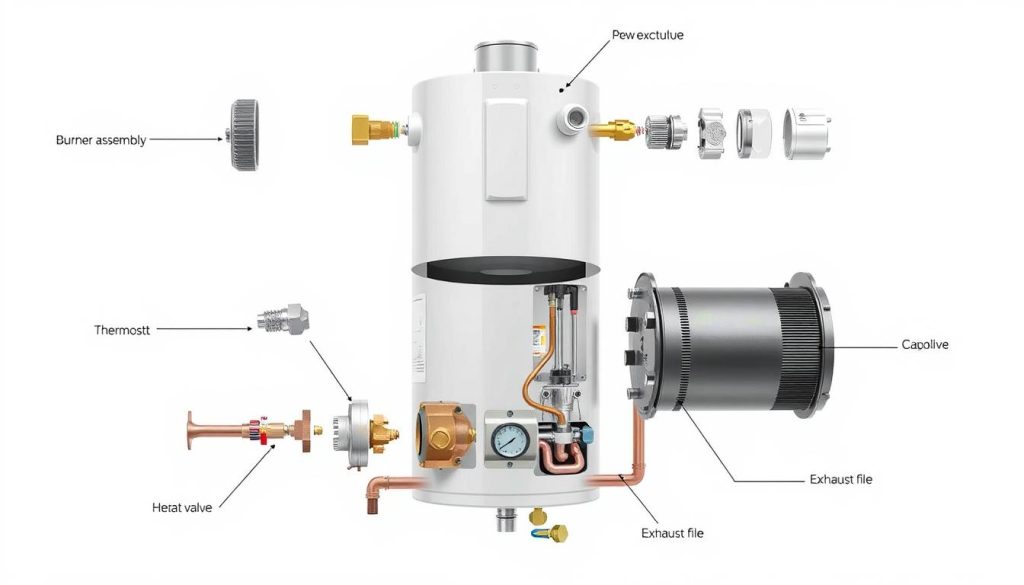
Gas water heaters have several important parts that work together to provide hot water heater tank parts. Understanding what these components are can assist you with water heater maintenance.
Burner Assembly: The Heat Source
The burner assembly is crucial for heating water. It’s at the bottom of the tank and runs on gas to heat the water. Modern burners are very efficient, converting around 60-61% of the fuel into heat.
- Ignites gas to heat water
- Positioned beneath the water tank
- Gas controlled via control valves
Thermocouple: Safety First
The thermocouple is a safety feature of gas water heaters. It inspects the pilot light and shuts off the gas if it’s extinguished. This prevents gas leaks and protects your home.
Heating Chamber and Insulation
The heating chamber is where all the water gets hot. It’s insulated so the heat is kept in. The dip tube ensures cold water is directed to the bottom for uniform heating.
Gas Valve: Regulating Fuel Supply
The gas valve regulates the flow of gas into the burner. For all the technology those systems use, though, valves now on the market will no longer leave you in the dark, and some will even tell you if there’s a problem. The anode rod is designed to protect the tank from corrosive action.
“Knowing the parts in your water heater can help you learn how to maintain your water heater.” – Home Solution Professional
Other Key Parts
- Pressure relief valve
- Drain valve
- Exhaust flue
Maintaining these elements keeps your water heater working at peak performance. It might even last longer.
Gas Water Heater Safety Features

Gas water heaters have crucial safety features for homeowners to stay safe. Learning about these features will help guarantee the well-being and safety of your water heater. Gas water heaters today have multiple safety devices. These components act in the same system to prevent unsafe scenarios. The draft hood and burner system are essential to safe operation.
Safety Shut-Off Valve: Your First Line of Defense
The safety shut-off valve is a critical component. It prevents gas flow under some conditions:
- Gas stays off if the pilot light goes out
- Stops gas leaks
- Prevents fires
Flame Arrestor: Safely Holds Combustion
A flame arrestor is an important safety feature of the burner assembly. It performs several crucial functions:
- Prevents flames from spreading beyond the chamber
- Prevents fires from rekindling
- Protects other parts from flames
Pressure Relief Valve: Avoiding Explosions
Another important safety feature is the pressure relief valve. It keeps the pressure in the tank in check. If the pressure builds up:
- Releases extra pressure automatically
- Prevents tank explosions
- Keeps the system safe
“Safety is not always a matter of chance; it is a matter of choice.” – Unknown
Home gas water heaters conform with ANSI and other standards. They feature Flammable Vapor Ignition Resistant (FVIR) technology, which minimizes the danger of flammable vapors igniting outside the appliance.
How to Identify Common Issues
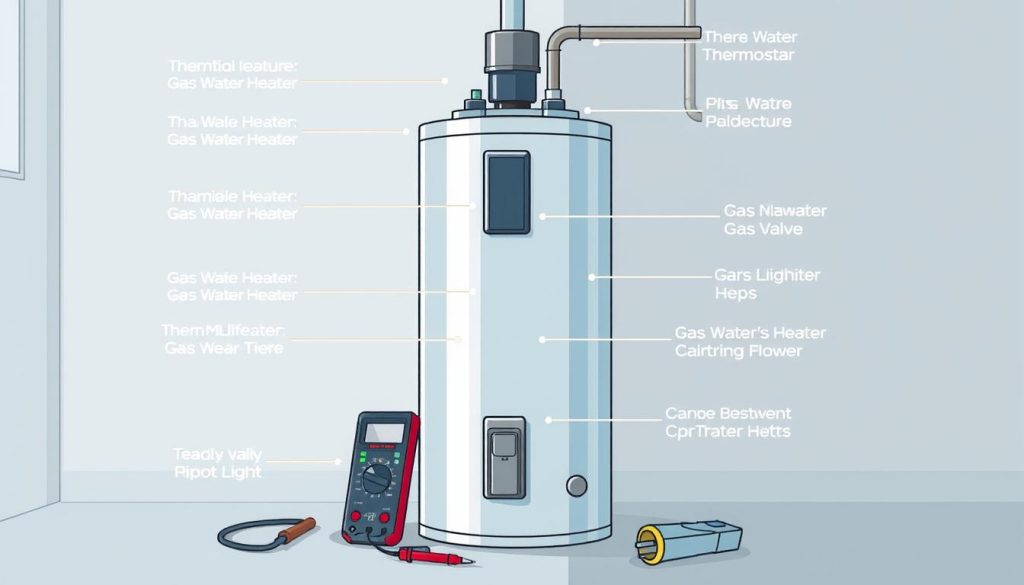
Gas water heaters can experience numerous issues that impact their function and efficiency. Spotting early warnings can prevent costly fixes and system breakdowns.
Signals of a Defective Heater
Recognizing problems with gas water heater parts requires conscious observation. You should know these warning signs:
- Inconsistent water temperature
- Strange sounds in the heating chamber
- Discolored or rusty water
- Pilot light frequently extinguishing
- Water leaks around the base of the heater
“Catching water heater problems early can save you more costly damage to gas water heater replacement parts,” says Mark Reynolds, a cast iron plumbing materials and methods scientist.
Diagnosing Gas Water Heater Problems
When you suspect a faulty element, turn to the main components first.
Checking the Anatomy of a Hot Water Heater
When diagnosing problems with a water heater, remember that gas and electric water heaters are very different. HomeAdvisor identifies three trouble areas:
- Pilot Light Failure: Ensure the flame is stable and clean the area around it
- Thermocouple Failure: Check for wear and electrical connections
- Gas Control Valve Problems: Examine temperature settings and valve function
Understanding these standard issues helps you decide if you can fix the problem yourself or need to bring in a professional.
Essential Replacement Parts

Maintaining your gas water heaters is about understanding the critical water heater tank parts. These are critical for the unit’s performance and longevity. Gas water heaters have parts that can be repaired or replaced. The gas water heater thermocouple is one of the most important gas water heater parts. It prevents gas leaks and ensures the heater runs properly.
Where to Find Quality Parts
Finding good replacement parts requires some thought. You have several places to look:
- Specialty plumbing supply stores
- Online retailers specializing in water heater parts
- Authorized dealers of the manufacturer
- Local hardware shops with a variety of parts
Price Considerations for Replacement Parts
The cost of water heater parts varies depending on what you need and the brand. Prices typically fall within these ranges:
| Component | Average Price Range |
|---|---|
| Thermocouple | $20 – $50 |
| Anode Rod | $30 – $100 |
| Pressure Relief Valve | $15 – $40 |
“Quality parts are the key to maintaining the efficiency of your water heater and preventing costly repairs.” “Having a professional help you identify the specific parts you need for your make and model can pinpoint exactly what you need.”
Brands like AO Smith, Bradford White, and Camco offer a variety of parts. They are a way to maintain the health of your gas water heater.
Maintenance for Longevity
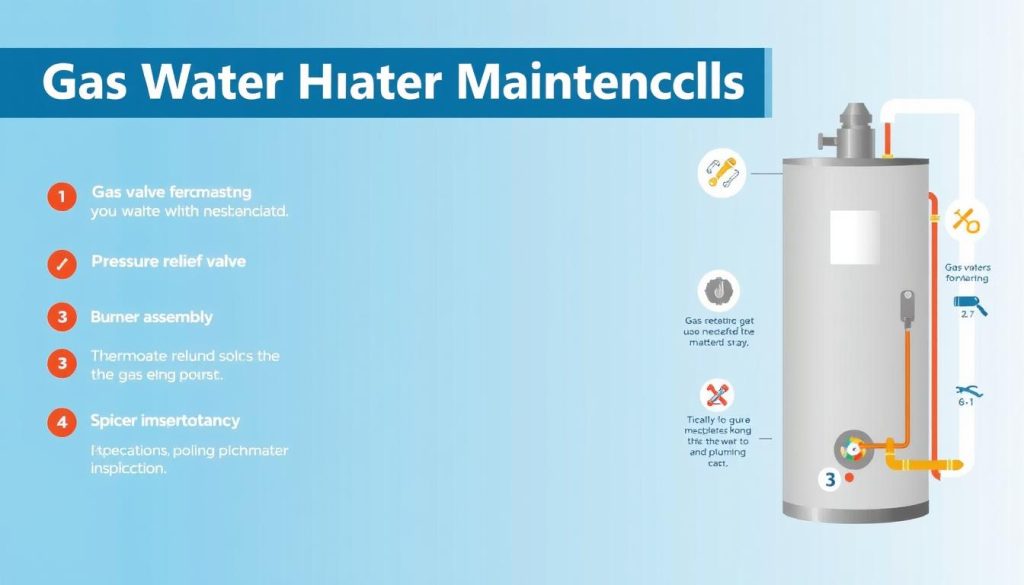
Maintain the performance and service life of your gas water heater by ensuring proper maintenance is done at regular intervals. With proper maintenance, you can prevent costly repairs and enjoy hot water for years to come.
Heater Cleaning and Flushing
Timely maintenance of your gas water heater is key. It prevents sediment buildup and damage. Flushing the tank annually cleans out damaging mineral deposits that lower efficiency and can reduce the tank’s lifespan.
- Empty the tank completely to remove sediment
- Check for proper operation of the gas water heater pilot assembly
- Inspect the gas water heater anode rod for corrosion
“Preventative maintenance is the best way to ensure your water heater will have a long, worry-free life.”
Checklist for Regular Inspections
A regular inspection schedule will enhance the performance of your heater. Professional inspections by trained technicians can uncover problems before they become larger, more costly issues.
| Maintenance Task | Frequency | Purpose |
|---|---|---|
| Anode Rod Inspection | Every 3-5 years | Prevent tank corrosion |
| Pressure Relief Valve Test | Annually | Ensure safety mechanisms work |
| Pilot Assembly Check | Annually | Verify proper function |
Pro tip: Lowering your water heater temperature by 10 degrees can save up to 5% on energy costs while reducing wear on the system, according to energysavers.gov.
Following these maintenance tips, your gas water heater should last 8 to 12 years. Some well-maintained units can last even longer.
Professional vs. DIY Repairs

It can be challenging for homeowners to deal with water heaters. Knowing when to DIY repairs and when to call a professional can save money and time. It also reduces safety risks.
When to Bring in a Professional
For some water heater problems, working with a professional is the best solution. For complex issues like gas burner problems or comprehensive system checks, you will need an expert.
- Gas line complications
- Major system leaks
- Complete system failure
- Complex gas water heater dip tube installations
“Your concern is always safety when working with gas appliances.” – HVAC Professional
DIY Repairs
Some maintenance tasks can be handled safely by homeowners. Easy repairs, such as cleaning the burner module or inspecting the dip tube, are manageable.
- Check the burner assembly for debris and clean it if needed
- Replace a faulty thermocouple with proper tools
- Flush the tank to remove sediment buildup
| DIY Repair | Professional Required |
|---|---|
| Cleaning burner assembly | Gas line repairs |
| Replacing thermocouple | Major system leaks |
| Flushing tank | Complex electrical issues |
When beginning any repair, safety should be your top priority. Be sure to shut off the gas and power. Also, check the manufacturer’s guidelines. If in doubt, call a licensed professional to prevent damage and risks.
Tools You’ll Need for Repairs
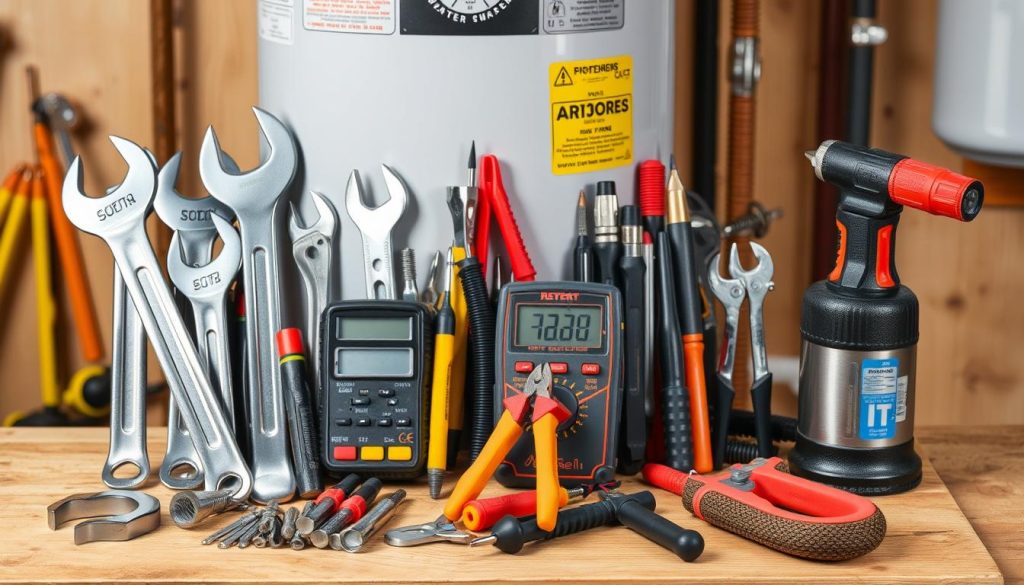
Preparing for gas water heater repair work requires careful planning and the right tools. If you’re doing it yourself, having the proper tools keeps you safe and enables you to complete the project when working with water heater parts.
Repair Essentials: Handy Hand Tools
Proper hand tools are essential when repairing the draft hood and tank of a gas water heater. Here is a list of tools you cannot do without:
- Adjustable pipe wrench (10-14 inch)
- Screwdriver set (flathead and Phillips)
- Pliers (needle-nose and adjustable)
- Multimeter for electrical testing
- Open-end wrenches
- Soft wire brush
Essential Safety Gear
When dealing with gas appliances, safety should always be your priority. Here’s what you need to stay safe:
- Safety glasses with side shields
- Thick work gloves
- Sturdy closed-toe shoes
- Gas leak detector
- Flashlight with extra batteries
“Appropriate tools and safety equipment are your first lines of defense in gas water heater maintenance.” – HVAC Professional
Note: Some water heaters may require specific tools. Always refer to your manufacturer’s manual for the appropriate tools for your gas water heater’s draft hood and tank parts.
When to Replace Your Heater

It can be difficult for homeowners to know whether to replace a gas water heater or wait until it fails. Being able to identify wear and failure symptoms will enable you to make informed decisions about purchasing the correct parts and executing a replacement strategy.
Key Signs Your Water Heater Needs Replacement
Several signs indicate that a gas water heater needs to be replaced. Age is a significant factor. Most conventional units, even high-quality, professionally installed ones, last between 8 to 12 years.
- Continual leaks in the tank or base
- Rusty or discolored water
- Inconsistent water temperature
- Unusual rumbling or popping sounds
- Frequent repairs needed for gas water heater parts
Determining Energy Efficiency
When reviewing gas water heater parts, energy efficiency is one of the most important factors. New models are more cost-effective and perform better.
| Efficiency Factor | Impact on Replacement Decision |
|---|---|
| Energy Star Certification | Can reduce energy consumption by 10-15% |
| Uniform Energy Factor (UEF) | Indicates overall system efficiency |
| Annual Operating Cost | Up to $100 to $300 a year in projected savings |
“Purchasing a tankless, energy-efficient water heater is not a cost; it’s an investment.”
Replace when repair costs approach 50% of a new unit’s cost.
Innovations in Gas Water Heaters
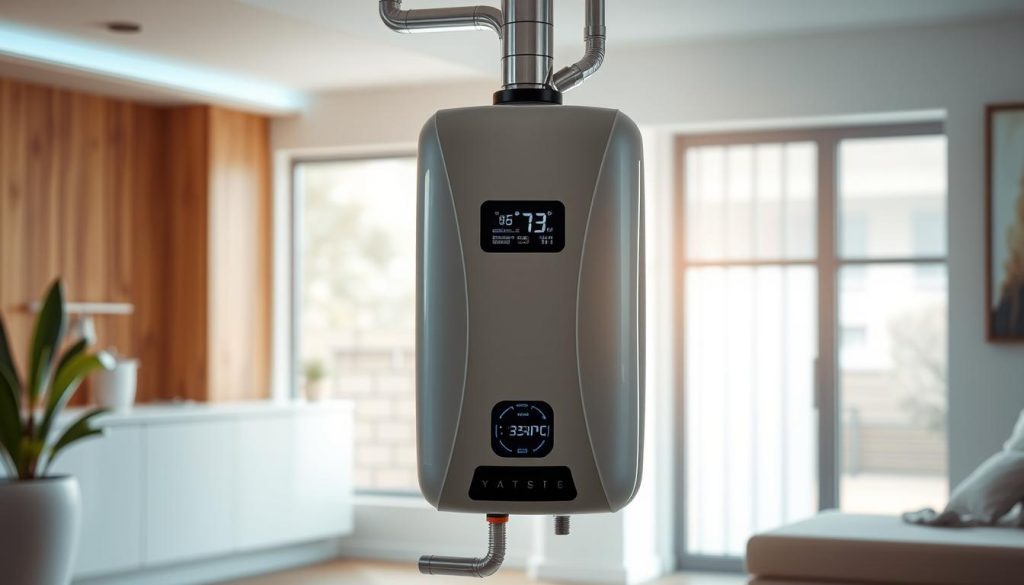
The landscape of gas water heater technology is evolving rapidly. These systems are becoming smarter and more efficient with new technology. Homeowners now have more options to manage their water heating systems.
Smart Technology Revolutionizing Water Heating
Gas water heaters are becoming smarter and easier to use. The thermocouple and pilot assembly have been updated with smart monitoring technology.
- Wi-Fi-enabled remote temperature control
- Self-diagnostic system capabilities
- Real-time performance tracking
- Energy consumption monitoring
Energy Efficiency Breakthroughs
New gas water heaters are far more efficient, achieving up to 99% energy efficiency. They also maintain precise temperature control, within ±4°F.
| Innovation Feature | Performance Metric |
|---|---|
| Efficiency Rating | Up to 99% |
| Temperature Control | ±4°F Precision |
| Output Range | 625-1350 MBH |
| NOx Emissions | Less than 20 ppm |
“The future of water heating is smart, efficient, and green.” – Energy Technology Expert
Tankless models save energy by operating at lower temperatures, which results in significant energy savings. They also integrate with other units to optimize energy use. Electronic controls and smart water heater technology represent a quantum leap in energy efficiency compared to other options on the market.
Understanding Codes and Regulations
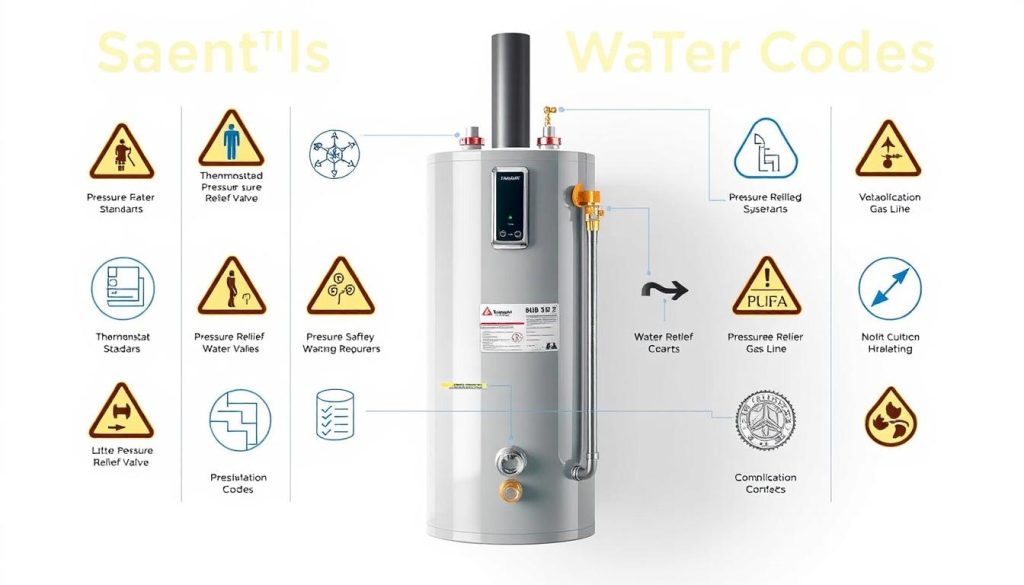
Navigating gas water heater codes requires close attention to local and national standards. Homeowners must understand the key codes that ensure safe and proper installation of their water-heating systems. Local building codes are critical in gas water heater installation and repair, establishing safety standards to protect homeowners.
Key Local Code Considerations
- Permits required for new installations
- Specific venting requirements
- Minimum distance from flammable materials
- Proper installation of the gas water heater dip tube
- Correct positioning of the gas water heater anode rod
Vital Safety Standards
The American National Standards Institute (ANSI) provides comprehensive codes that ensure gas water heaters are safe. These standards address critical aspects of water heater design and performance.
“Following safety standards is not optional—it’s essential for protecting your home and family.”
Critical Regulatory Requirements
- Seismic straps are mandatory in earthquake-prone areas
- Discharge pipes must direct water to safe locations
- Sediment traps are required to prevent debris from clogging the gas valve
- Dielectric fittings must be used when connecting poly to metal water lines to prevent corrosion
Since 2015, gas water heaters have been subject to new efficiency rules by the U.S. Department of Energy. These rules mandate improved insulation and advanced technology for water heaters with 30 to 50-gallon capacities. Understanding these codes ensures your gas water heater operates safely, efficiently, and in compliance with local regulations.
Keeping Your Gas Water Heater Efficient
You should understand how your gas water heater functions. The burner assembly is critical for heating, protected by the draft hood to ensure safe and proper ventilation. Water heaters typically last 8 to 12 years, but good maintenance can extend their lifespan. Regular upkeep prevents sudden breakdowns. Experts recommend flushing the tank annually to remove sediment, which helps your heater function properly and last longer. Additionally, inspect the anode rod and address issues early to avoid expensive repairs.
Overview of Key Parts and Maintenance
Modern water heaters have numerous parts that can fail. Regular inspections help detect and fix issues before they escalate. Watch for signs like strange noises, rust, or uneven heating, which indicate something is wrong.
Tips for Homeowners
To keep your gas water heater running strong, understand its parts and maintain it well. Schedule professional inspections, keep the area clean, and seek help if you notice anything unusual. With the right care, your heater will work better, safer, and longer.
